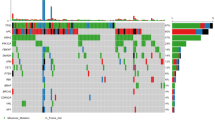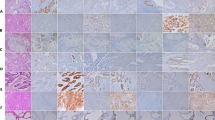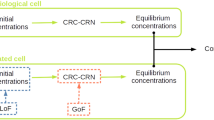Abstract
Colorectal cancer (CRC) is widespread with significant mortality. Both inherited and sporadic mutations in various signaling pathways influence the development and progression of the cancer. Identifying genetic mutations in CRC is important for optimal patient treatment and many approaches currently exist to uncover these mutations, including next-generation sequencing (NGS) and commercially available kits. In the present study, we used a semiconductor-based targeted DNA-sequencing approach to sequence and identify genetic mutations in 91 human rectal cancer samples. Analysis revealed frequent mutations in KRAS (58.2%), TP53 (28.6%), APC (16.5%), FBXW7 (9.9%) and PIK3CA (9.9%), and additional mutations in BRAF, CTNNB1, ERBB2 and SMAD4 were also detected at lesser frequencies. Thirty-eight samples (41.8%) also contained two or more mutations, with common combination mutations occurring between KRAS and TP53 (42.1%), and KRAS and APC (31.6%). DNA sequencing for individual cancers is of clinical importance for targeted drug therapy and the advantages of such targeted gene sequencing over other NGS platforms or commercially available kits in sensitivity, cost and time effectiveness may aid clinicians in treating CRC patients in the near future.
Similar content being viewed by others
Log in or create a free account to read this content
Gain free access to this article, as well as selected content from this journal and more on nature.com
or
References
Ferlay, J., Soerjomataram, I., Dikshit, R., Eser, S., Mathers, C., Rebelo, M. et al. Cancer incidence and mortality worldwide: sources, methods and major patterns in GLOBOCAN 2012. Int. J. Cancer 136, E359–E386 (2015).
Vogelstein, B., Papadopoulos, N., Velculescu, V. E., Zhou, S., Diaz, L. A. & Kinzler, K. W. Cancer genome landscapes. Science 339, 1546–1558 (2013).
Aaltonen, L., Johns, L., Jarvinen, H., Mecklin, J. P. & Houlston, R. Explaining the familial colorectal cancer risk associated with mismatch repair (MMR)-deficient and MMR-stable tumors. Clin. Cancer Res. 13, 356–361 (2007).
Fearnhead, N. S., Wilding, J. L. & Bodmer, W. F. Genetics of colorectal cancer: hereditary aspects and overview of colorectal tumorigenesis. Br. Med. Bull. 64, 27–43 (2002).
Rustgi, A. K. The genetics of hereditary colon cancer. Genes Dev. 21, 2525–2538 (2007).
Smith, G., Carey, F. A., Beattie, J., Wilkie, M. J., Lightfoot, T. J., Coxhead, J. et al. Mutations in APC, Kirsten-ras, and p53—alternative genetic pathways to colorectal cancer. Proc. Natl Acad. Sci. USA 99, 9433–9438 (2002).
He, J. & Efron, J. E. Screening for colorectal cancer. Adv. Surg. 45, 31–44 (2011).
Nelson, R. S. & Thorson, A. Colorectal cancer screening. Curr. Oncol. Rep. 11, 482–489 (2009).
Misale, S., Yaeger, R., Hobor, S., Scala, E., Janakiraman, M., Liska, D. et al. Emergence of KRAS mutations and acquired resistance to anti-EGFR therapy in colorectal cancer. Nature 486, 532–536 (2012).
Amado, R. G., Wolf, M., Peeters, M., Van Cutsem, E., Siena, S., Freeman, D. J. et al. Wild-type KRAS is required for panitumumab efficacy in patients with metastatic colorectal cancer. J. Clin. Oncol. 26, 1626–1634 (2008).
Allegra, C. J., Jessup, J. M., Somerfield, M. R., Hamilton, S. R., Hammond, E. H., Hayes, D. F. et al. American Society of Clinical Oncology provisional clinical opinion: testing for KRAS gene mutations in patients with metastatic colorectal carcinoma to predict response to anti–epidermal growth factor receptor monoclonal antibody therapy. J. Clin. Oncol. 27, 2091–2096 (2009).
Pinto, P., Rocha, P., Veiga, I., Guedes, J., Pinheiro, M., Peixoto, A. et al. Comparison of methodologies for KRAS mutation detection in metastatic colorectal cancer. Cancer Genet. 204, 439–446 (2011).
Ulahannan, D., Kovac, M. B., Mulholland, P. J., Cazier, J. B. & Tomlinson, I. Technical and implementation issues in using next-generation sequencing of cancers in clinical practice. Br. J. Cancer 109, 827–835 (2013).
Meldrum, C., Doyle, M. A. & Tothill, R. W. Next-generation sequencing for cancer diagnostics: a practical perspective. Clin. Biochem. Rev. 32, 177–195 (2011).
Losi, L., Baisse, B., Bouzourene, H. & Benhattar, J. Evolution of intratumoral genetic heterogeneity during colorectal cancer progression. Carcinogenesis 26, 916–922 (2005).
Glenn, T. C. Field guide to next-generation DNA sequencers. Mol. Ecol. Resour. 11, 759–769 (2011).
Bai, X., Zhang, E., Ye, H., Nandakumar, V., Wang, Z., Chen, L. et al. PIK3CA and TP53 gene mutations in human breast cancer tumors frequently detected by ion torrent DNA sequencing. PLoS ONE 9, e99306 (2014).
Cai, X., Sheng, J., Tang, C., Nandakumar, V., Ye, H., Ji, H. et al. Frequent mutations in EGFR, KRAS and TP53 genes in human lung cancer tumors detected by ion torrent DNA sequencing. PLoS ONE 9, e95228 (2014).
Consortium, G.P A map of human genome variation from population-scale sequencing. Nature 467, 1061–1073 (2010).
NHLBI Go Exome Sequencing Project (ESP). Exome Variant Server. Seattle, WA http://evs.gs.washington.edu/EVS/. Accessed 19 March (2014).
Bamford, S., Dawson, E., Forbes, S., Clements, J., Pettett, R., Dogan, A. et al. The COSMIC (Catalogue of Somatic Mutations in Cancer) database and website. Br. J. Cancer 91, 355–358 (2004).
Akhoondi, S., Sun, D., von der Lehr, N., Apostolidou, S., Klotz, K., Maljukova, A. et al. FBXW7/hCDC4 is a general tumor suppressor in human cancer. Cancer Res. 67, 9006–9012 (2007).
Jardim, D. L., Wheler, J. J., Hess, K., Tsimberidou, A. M., Zinner, R., Janku, F. et al. FBXW7 mutations in patients with advanced cancers: clinical and molecular characteristics and outcomes with mTOR inhibitors. PLoS ONE 9, e89388 (2014).
Forbes, S. A., Beare, D., Gunasekaran, P., Leung, K., Bindal, N., Boutselakis, H. et al. COSMIC: exploring the world’s knowledge of somatic mutations in human cancer. Nucleic Acids Res. 43, D805–D811 (2015).
Maitra, A., Molberg, K., Albores-Saavedra, J. & Lindberg, G. Loss of Dpc4 expression in colonic adenocarcinomas correlates with the presence of metastatic disease. Am. J. Pathol. 157, 1105–1111 (2000).
Cancer Genome Atlas Network Comprehensive molecular characterization of human colon and rectal cancer. Nature 487, 330–337 (2012).
Lynch, H. T. & de la Chapelle, A. Hereditary colorectal cancer. N. Engl. J. Med. 348, 919–932 (2003).
Ling, C., Wang, L., Wang, Z., Xu, L., Sun, L., Yang, H. et al. A pathway-centric survey of somatic mutations in Chinese patients with colorectal carcinomas. PLoS ONE 10 (2015).
Béroud, C. & Soussi, T. APC gene: database of germline and somatic mutations in human tumors and cell lines. Nucleic Acids Res. 24, 121–124 (1996).
Mori, Y., Nagse, H., Ando, H., Horii, A., Ichii, S., Nakatsuru, S. et al. Somatic mutations of the APC gene in colorectal tumors: mutation cluster region in the APC gene. Hum. Mol. Genet. 1, 229–233 (1992).
Huang, D. & Du, X. Crosstalk between tumor cells and microenvironment via Wnt pathway in colorectal cancer dissemination. World J. Gastroenterol. 14, 1823–1827 (2008).
Zoratto, F., Rossi, L., Verrico, M., Papa, A., Basso, E., Zullo, A. et al. Focus on genetic and epigenetic events of colorectal cancer pathogenesis: implications for molecular diagnosis. Tumour Biol. 35, 6195–6206 (2014).
Lesko, A. C., Goss, K. H. & Prosperi, J. R. Exploiting APC function as a novel cancer therapy. Curr. Drug Targets 15, 90–102 (2014).
Minella, A. C. & Clurman, B. E. Mechanisms of tumor suppression by the SCFFbw7. Cell Cycle 4, 1356–1359 (2005).
Takeishi, S. & Nakayama, K. I. Role of Fbxw7 in the maintenance of normal stem cells and cancer-initiating cells. Br. J. Cancer 111, 1054–1059 (2014).
Welcker, M. & Clurman, B. E. FBW7 ubiquitin ligase: a tumour suppressor at the crossroads of cell division, growth and differentiation. Nat. Rev. Cancer 8, 83–93 (2008).
Grim, J. E., Knoblaugh, S. E., Guthrie, K. A., Hagar, A., Swanger, J., Hespelt, J. et al. Fbw7 and p53 cooperatively suppress advanced and chromosomally unstable intestinal cancer. Mol. Cell. Biol. 32, 2160–2167 (2012).
Iwatsuki, M., Mimori, K., Ishii, H., Yokobori, T., Takatsuno, Y., Sato, T. et al. Loss of FBXW7, a cell cycle regulating gene, in colorectal cancer: clinical significance. Int. J. Cancer 126, 1828–1837 (2010).
Chang, C. C., Lin, H. H., Lin, J. K., Lin, C. C., Lan, Y. T., Wang, H. S. et al. FBXW7 mutation analysis and its correlation with clinicopathological features and prognosis in colorectal cancer patients. Int. J. Biol. Markers 30, e88–e95 (2014).
Adjei, A. A. Blocking oncogenic Ras signaling for cancer therapy. J. Natl Cancer Inst. 93, 1062–1074 (2001).
Downward, J. Targeting RAS signalling pathways in cancer therapy. Nat. Rev. Cancer 3, 11–22 (2003).
Wan, P. T. C., Garnett, M. J., Roe, S. M., Lee, S., Niculescu-Duvaz, D., Good, V. M. et al. Mechanism of activation of the RAF-ERK signaling pathway by oncogenic mutations of B-RAF. Cell 116, 855–867 (2004).
Phipps, A. I., Buchanan, D. D., Makar, K. W., Win, A. K., Baron, J. A., Lindor, N. M. et al. KRAS-mutation status in relation to colorectal cancer survival: the joint impact of correlated tumour markers. Br. J. Cancer 108, 1757–1764 (2013).
Kalady, M. F., Dejulius, K. L., Sanchez, J. A., Jarrar, A., Liu, X., Manilich, E. et al. BRAF mutations in colorectal cancer are associated with distinct clinical characteristics and worse prognosis. Dis. Colon Rectum 55, 128–133 (2012).
Zhao, L. & Vogt, P. K. Class I PI3K in oncogenic cellular transformation. Oncogene 27, 5486–5496 (2008).
Bader, A. G., Kang, S. & Vogt, P. K. Cancer-specific mutations in PIK3CA are oncogenic in vivo. Proc. Natl Acad. Sci. USA 103, 1475–1479 (2006).
Kang, S., Bader, A. G., Zhao, L. & Vogt, P. K. Mutated PI 3-kinases: cancer targets on a silver platter. Cell Cycle 4, 571–574 (2005).
Ogino, S., Nosho, K., Kirkner, G. J., Shima, K., Irahara, N., Kure, S. et al. PIK3CA mutation is associated with poor prognosis among patients with curatively resected colon cancer. J. Clin. Oncol. 27, 1477–1484 (2009).
Kato, S., Iida, S., Higuchi, T., Ishikawa, T., Takagi, Y., Yasuno, M. et al. PIK3CA mutation is predictive of poor survival in patients with colorectal cancer. Int. J. Cancer 121, 1771–1778 (2007).
Mesker, W. E., Liefers, G. J., Junggeburt, J. M., van Pelt, G. W., Alberici, P., Kuppen, P. J. et al. Presence of a high amount of stroma and downregulation of SMAD4 predict for worse survival for stage I-II colon cancer patients. Cell Oncol. 31, 169–178 (2009).
Alazzouzi, H., Alhopuro, P., Salovaara, R., Sammalkorpi, H., Järvinen, H., Mecklin, J.-P. et al. SMAD4 as a prognostic marker in colorectal cancer. Clin. Cancer Res. 11, 2606–2611 (2005).
Woodford-Richens, K. L., Rowan, A. J., Gorman, P., Halford, S., Bicknell, D. C., Wasan, H. S. et al. SMAD4 mutations in colorectal cancer probably occur before chromosomal instability, but after divergence of the microsatellite instability pathway. Proc. Natl Acad. Sci. 98, 9719–9723 (2001).
Ihle, N. T., Lemos, R., Wipf, P., Yacoub, A., Mitchell, C., Siwak, D. et al. Mutations in the phosphatidylinositol-3-kinase pathway predict for antitumor activity of the inhibitor PX-866 whereas oncogenic ras is a dominant predictor for resistance. Cancer Res. 69, 143–150 (2009).
Di Nicolantonio, F., Arena, S., Tabernero, J., Grosso, S., Molinari, F., Macarulla, T. et al. Deregulation of the PI3K and KRAS signaling pathways in human cancer cells determines their response to everolimus. J. Clin. Invest. 120, 2858–2866 (2010).
Garnett, M. J., Edelman, E. J., Heidorn, S. J., Greenman, C. D., Dastur, A., Lau, K. W. et al. Systematic identification of genomic markers of drug sensitivity in cancer cells. Nature 483, 570–575 (2012).
Zhang, B., Zhang, B., Chen, X., Bae, S., Singh, K., Washington, M. K. et al. Loss of Smad4 in colorectal cancer induces resistance to 5-fluorouracil through activating Akt pathway. Br. J. Cancer 110, 946–957 (2014).
Alhopuro, P., Alazzouzi, H., Sammalkorpi, H., Dávalos, V., Salovaara, R., Hemminki, A. et al. SMAD4 levels and response to 5-fluorouracil in colorectal cancer. Clin. Cancer Res. 11, 6311–6316 (2005).
Lièvre, A., Bachet, J.-B., Le Corre, D., Boige, V., Landi, B., Emile, J.-F. et al. KRAS mutation status is predictive of response to cetuximab therapy in colorectal cancer. Cancer Res. 66, 3992–3995 (2006).
Benvenuti, S., Sartore-Bianchi, A., Di Nicolantonio, F., Zanon, C., Moroni, M., Veronese, S. et al. Oncogenic activation of the RAS/RAF signaling pathway impairs the response of metastatic colorectal cancers to anti-epidermal growth factor receptor antibody therapies. Cancer Res. 67, 2643–2648 (2007).
Tsiatis, A. C., Norris-Kirby, A., Rich, R. G., Hafez, M. J., Gocke, C. D., Eshleman, J. R. et al. Comparison of Sanger sequencing, pyrosequencing, and melting curve analysis for the detection of KRAS mutations: diagnostic and clinical implications. J. Mol. Diagn. 12, 425–432 (2010).
Farnebo, M., Bykov, V. J. N. & Wiman, K. G. The p53 tumor suppressor: a master regulator of diverse cellular processes and therapeutic target in cancer. Biochem. Biophys. Res. Commun. 396, 85–89 (2010).
Green, D. R. & Kroemer, G. Cytoplasmic functions of the tumour suppressor p53. Nature 458, 1127–1130 (2009).
Soussi, T. & Wiman, K. G. Shaping genetic alterations in human cancer: the p53 mutation paradigm. Cancer Cell 12, 303–312 (2007).
Madani, K., Zhao, R., Lim, H. J. & Casson, A. G. Prognostic value of p53 mutations in oesophageal adenocarcinoma: final results of a 15-year prospective study. Eur. J. Cardiothorac. Surg. 37, 1427–1432 (2010).
Vazquez, A., Bond, E. E., Levine, A. J. & Bond, G. L. The genetics of the p53 pathway, apoptosis and cancer therapy. Nat. Rev. Drug Discov. 7, 979–987 (2008).
Kapiteijn, E., Liefers, G. J., Los, L. C., Klein Kranenbarg, E., Hermans, J., Tollenaar, R.A.E.M. et al. Mechanisms of oncogenesis in colon versus rectal cancer. J. Pathol. 195, 171–178 (2001).
Yamaguchi, A., Kurosaka, Y., Fushida, S., Kanno, M., Yonemura, Y., Miwa, K. et al. Expression of p53 protein in colorectal cancer and its relationship to short-term prognosis. Cancer 70, 2778–2784 (1992).
Goh, H. S., Yao, J. & Smith, D. R. p53 point mutation and survival in colorectal cancer patients. Cancer Res. 55, 5217–5221 (1995).
Soong, R., Powell, B., Elsaleh, H., Gnanasampanthan, G., Smith, D. R., Goh, H. S. et al. Prognostic significance of TP53 gene mutation in 995 cases of colorectal carcinoma: influence of tumour site, stage, adjuvant chemotherapy and type of mutation. Eur. J. Cancer 36, 2053–2060 (2000).
Wong, N.A.C.S., Gonzalez, D., Salto-Tellez, M., Butler, R., Diaz-Cano, S. J., Ilyas, M. et al. RAS testing of colorectal carcinoma—a guidance document from the Association of Clinical Pathologists Molecular Pathology and Diagnostics Group. J. Clin. Pathol. 67, 751–757 (2014).
Acknowledgements
We thank Rong Shi at the Wu Jieping Foundation and Dr Haibo Wang, Zhi Yu, Ying Li and other members of San Valley Biotechnology Inc., Beijing, for their assistance in sample and data collection. We also thank the staffs at the Beijing Military Hospital for their generous support for DNA sequencing and data collection. This research was supported by grants from the National Natural Science Foundation of China, the Wu Jieping Foundation and the National Institute of Health (R01 CA90427 and R01 AI084811 to SY-C).
Author information
Authors and Affiliations
Corresponding authors
Ethics declarations
Competing interests
Authors CT, HY, FL, ZL, ZD and BG are employees of San Valley Biotechnology, Inc. in Beijing, China. This does not alter our adherence to the Journal’s policies on sharing data and materials. All other authors declare no conflict of interest.
Additional information
Supplementary Information accompanies the paper on Journal of Human Genetics website
Supplementary information
Rights and permissions
About this article
Cite this article
Bai, J., Gao, J., Mao, Z. et al. Genetic mutations in human rectal cancers detected by targeted sequencing. J Hum Genet 60, 589–596 (2015). https://doi.org/10.1038/jhg.2015.71
Received:
Revised:
Accepted:
Published:
Issue date:
DOI: https://doi.org/10.1038/jhg.2015.71
This article is cited by
-
Tumor location matters, next generation sequencing mutation profiling of left-sided, rectal, and right-sided colorectal tumors in 552 patients
Scientific Reports (2024)
-
PTEN-induced kinase 1 gene single-nucleotide variants as biomarkers in adjuvant chemotherapy for colorectal cancer: a retrospective study
BMC Gastroenterology (2023)
-
The first comprehensive genomic characterization of rectal squamous cell carcinoma
Journal of Gastroenterology (2023)
-
Next-generation sequencing: recent applications to the analysis of colorectal cancer
Journal of Translational Medicine (2017)
-
Targeted molecular profiling of rare genetic alterations in colorectal cancer using next-generation sequencing
Medical Oncology (2016)



